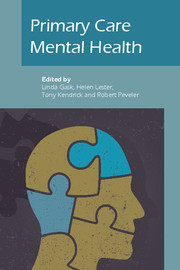Book contents
- Frontmatter
- Contents
- List of figures, tables and boxes
- List of contributors
- Preface
- Part I Conceptual basis and overarching themes
- Part II Clinical issues
- Part III Policy and practice
- Part IV Reflective practice
- 29 Teaching and learning about mental health
- 30 Undertaking mental health research in primary care
- 31 Individual treatment decisions: guidelines and clinical judgement
- 32 Self and others: the mental healthcare of the practitioner
- Epilogue: Racing pigeons and rolling rocks: reflections on complex problems in primary care
- Index
29 - Teaching and learning about mental health
from Part IV - Reflective practice
Published online by Cambridge University Press: 02 January 2018
- Frontmatter
- Contents
- List of figures, tables and boxes
- List of contributors
- Preface
- Part I Conceptual basis and overarching themes
- Part II Clinical issues
- Part III Policy and practice
- Part IV Reflective practice
- 29 Teaching and learning about mental health
- 30 Undertaking mental health research in primary care
- 31 Individual treatment decisions: guidelines and clinical judgement
- 32 Self and others: the mental healthcare of the practitioner
- Epilogue: Racing pigeons and rolling rocks: reflections on complex problems in primary care
- Index
Summary
Mental health education in primary care
Learning about psychiatry or mental health has, for those entering primary care practice in most countries, been a rather ‘hit and miss’ affair. As specific vocational training in the specialty of ‘general practice’ has developed across Europe in the past 50 years, there has been increasing recognition of the need for specific training in mental health, but the form that this should take has not always been clear. Experience of mental healthcare in large mental asylums is not appropriate preparation for the reality of mental healthcare in the broader community. In many low- and middle-income countries, specific training for primary care is now in place, although the mental health content of the curricula is generally still under consideration and thus able to be shaped.
In the UK, the informal curriculum was usually based on clinical practice in specialist hospital units, covered the ‘severe’ end of the spectrum of mental ill health and was usually knowledge rather than skills based. Research looking at the needs of general practice trainees (Williams, 1998) highlighted the gap between traditional, knowledge-based teaching and the trainees’ desire for practical skills development, with feedback on these skills in relation to mental health practice in primary care. Posts undertaken as part of the formal vocational training for general practitioners (GPs) in the 1990s were difficult to access and, usually, were part of acute, hospital-based services, with little or no primary care orientation.
In the UK, general practice specialist training, developed from the original GP vocational training programmes and now approved by the Postgraduate Medical Education and Training Board (PMETB), has a clear curriculum defined by the Royal College of General Practitioners (RCGP; see web link under Further reading and e-resources). Achievement of a Certificate of Completion of Training (CCT) for general practice involves ‘time served’ in appropriate and approved posts, workplace-based assessments of specific competencies, a clinical skills assessment at an independent centre and an applied knowledge test relevant to practice in UK primary care.
- Type
- Chapter
- Information
- Primary Care Mental Health , pp. 423 - 438Publisher: Royal College of PsychiatristsPrint publication year: 2009

